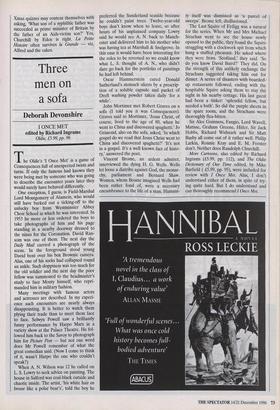Three men on a sofa
Deborah Devonshire
I ONCE MET edited by Richard Ingrams Oldie, £5.99, pp. 96 The Oldie's 'I Once Met' is a game of Consequences full of unexpected twists and turns. If only the famous had known they were being met by someone who was going to describe the encounter years later they would surely have behaved differently. One exception, I guess, is Field-Marshal Lord Montgomery of Alamein, who would still have barked out a ticking-off to the unlucky boy from Westminster Abbey Choir School in which he was interested. In 1953 he more or less ordered the boys to take photographs of him and his page standing in a nearby doorway dressed to the nines for the Coronation. David Ran- som was one of them. The next day the Daily Mail carried a photograph of the scene. In the foreground stood young David bent over his box Brownie camera. Alas, one of his socks had collapsed round an ankle. Such sloppiness was too much for the old soldier and the next day the poor fellow was summoned to the headmaster's study to face Monty himself, who repri- manded him in military fashion.
Many meetings with famous actors and actresses are described. In my experi- ence such encounters are nearly always disappointing. It is better to watch them plying their trade than to meet them face to face. Selwyn Powell saw a brilliantly funny performance by Harpo Marx in a variety show at the Palace Theatre. He fol- lowed him back to the Savoy to photograph him for Picture Post — but not one word does Mr Powell remember of what the great comedian said. (Now I come to think of it, wasn't Harpo the one who couldn't speak?) When A. N. Wilson was 12 he called on L. S. Lowly to seek advice on painting. The house in Salford was coal-black outside and chaotic inside. The artist, 'his white hair en brosse like a polar bear's', told the boy he preferred the Sunderland seaside because he couldn't paint trees. Twelve-year-old boys don't know when to leave, so after hours of his unplanned company Lowry said he would see A. N. back to Manch- ester and delivered him to his mother who was having tea at Marshall & Snelgrove. In this case it would have been interesting for the roles to be reversed so we could know what L. S. thought of A. N., who didn't dare go back for the portfolio of paintings he had left behind.
Oscar Hammerstein cured Donald Sutherland's stomach ulcers by a prescrip- tion of a soluble capsule and packet of Dreft washing powder taken daily 'for a while'.
John Mortimer met Robert Graves on a sofa (I told you it was Consequences). Graves said to Mortimer, 'Jesus Christ, of course, lived to the age of 80, when he went to China and discovered spaghetti.' Jo Grimond, also on the sofa, asked, 'In which gospel do we read that Jesus Christ went to China and discovered spaghetti?' It's not in a gospel. It's a well known fact of histo- ry,' answered the poet.
Vincent Brome, an ardent admirer, interviewed the dying H. G. Wells. Wells let loose a diatribe against God, the monar- chy, parliament and Bernard Shaw. Women, whom Brome imagined Wells had been rather fond .of, were a necessary encumbrance to the life of a man. Humani- ty itself was dismissed as 'a parcel of sweeps'. Brome left, disillusioned.
The Last Squire of Erdigg was a natural for the series. When Mr and Mrs Michael Strachan went to see the house newly opened to the public, they found the Squire struggling with a clockwork spit from which hung a stuffed pheasant. He asked where they were from. 'Scotland,' they said. 'So do you know David Baird?' They did. On the strength of this unlikely exchange the Strachans suggested taking him out for dinner. A series of disasters with boarded- up restaurants followed, ending with the hospitable Squire asking them to stay the night in his nearby cottage. His last guest had been a tinker: 'splendid fellow, but needed a bath'. So did the purple sheets in the spare room, and the Strachans were thoroughly flea-bitten.
Sir Alec Guinness, Fangio, Lord Wave11, Matisse, Graham Greene, Hitler, Sir Jack Hobbs, Richard Widmark and Sir Matt Busby all come out of it rather well. Philip Larkin, Ronnie Kray and E. M. Forster don't. Neither does Randolph Churchill.
More Cartoons, also edited by Richard Ingrams (£5.99, pp. 112), and The Oldie Dictionary of Our Time edited, by Mike Barfield ( £5.99, pp. 95), were included for review with I Once Met. Alas, I don't understand either of them, in spite of try- ing quite hard. But I do understand and can thoroughly recommend I Once Met.


















































































































 Previous page
Previous page